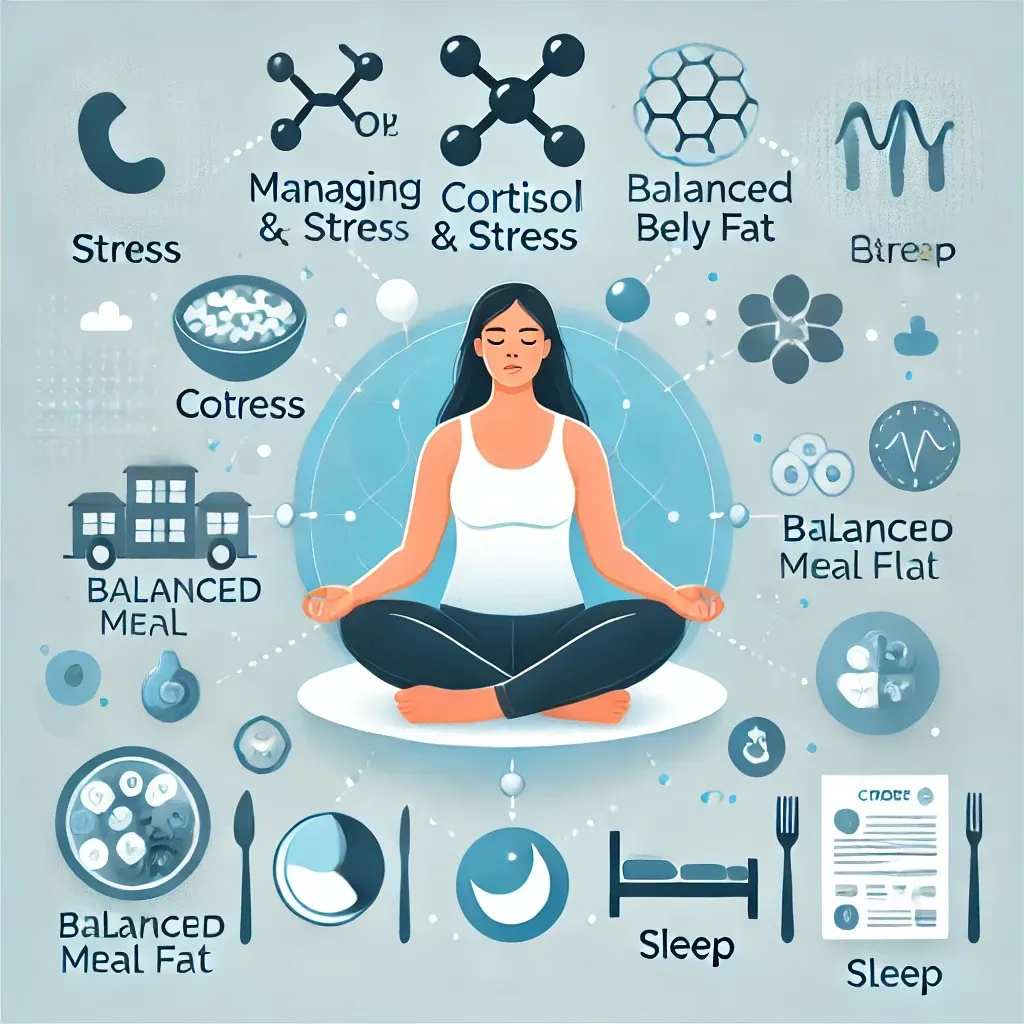
Cortisol, Stress, and Belly Fat: Breaking the Cycle
Stress and belly fat are often linked in a challenging cycle where stress increases cortisol production, contributing to belly fat, which in turn raises stress levels. Cortisol, known as the “stress hormone,” plays a key role in how the body responds to stress, including where it stores fat. This cycle can leave you feeling fatigued. In this post, we’ll dive into how this cycle works, why it’s so hard to break, and what you can do to manage stress and reduce belly fat effectively.
Understanding Cortisol and Its Effects on the Body
Cortisol is a hormone produced by the adrenal glands in response to stress. It helps the body manage the “fight or flight” response by releasing energy stores, increasing alertness, and focusing the body’s resources on managing immediate threats. However, when stress is chronic, cortisol remains elevated over time, leading to several health consequences.
High cortisol levels promote fat storage, especially around the abdomen, as the body prepares for “survival mode.” Belly fat, specifically visceral fat, is associated with higher health risks than fat stored in other areas because it surrounds vital organs. This type of fat can also contribute to feelings of fatigue, as it leads to inflammation and metabolic disruptions, further impacting energy levels and overall well-being.
The Impact of Stress on Your Waistline
When the body experiences stress, it releases cortisol to fuel a quick burst of energy. Unfortunately, prolonged stress triggers continued cortisol release, which can lead to:
Increased Appetite and Cravings: High cortisol levels are linked to a stronger appetite, particularly for calorie-dense and sugary foods. This drives weight gain, especially in the belly area.
Caloric Storage in the Abdomen: Stress-induced cortisol makes the body more prone to storing fat in the abdomen as a protective measure.
Sedentary Lifestyle Tendencies: Stress and its psychological effects, like anxiety or fatigue, often reduce motivation to exercise, creating a sedentary pattern that exacerbates weight gain.
This combination of increased appetite, cravings for comfort foods, and reduced physical activity creates a cycle that compounds stress, contributing to both weight gain and increased fatigue.
Strategies to Break the Cycle
While the cycle of stress, cortisol, and belly fat may seem hard to break, targeted strategies can make a difference. Here are some practical approaches to help you reduce cortisol levels, manage stress, and shed belly fat:
Stress Management Techniques: Practices like mindfulness meditation, deep breathing exercises, and yoga can effectively reduce cortisol levels. Incorporate these practices into your routine to help mitigate stress and prevent prolonged cortisol release.
Dietary Adjustments: Opt for whole foods that provide steady energy. Include foods high in fiber, lean proteins, and healthy fats that stabilize blood sugar and reduce cravings. Limiting sugar and processed foods can also prevent cortisol spikes.
Exercise: Moderate exercise, like walking, resistance training, and aerobic activities, helps burn calories and reduce cortisol levels. Focus on activities that you enjoy to create a sustainable routine that combats belly fat and improves energy.
Prioritize Sleep: Quality sleep is essential for hormone regulation, including cortisol. Aim for 7-9 hours per night and establish a relaxing pre-sleep routine to improve sleep quality. This will help reduce stress, boost energy, and support weight loss.
These lifestyle changes can create a positive feedback loop, helping to reduce belly fat, manage stress, and improve energy levels.
Conclusion
Addressing both stress and belly fat is key to breaking the cortisol cycle. Reducing cortisol levels through stress management, healthy eating, exercise, and sleep can help restore balance, reduce fatigue, and promote a healthier body composition.
Making these changes takes effort, but by incorporating them into your routine, you can take control of your health and wellness. With consistency and the right strategies, breaking the cycle is not only possible but also empowering—leading to a healthier, more energized you.
